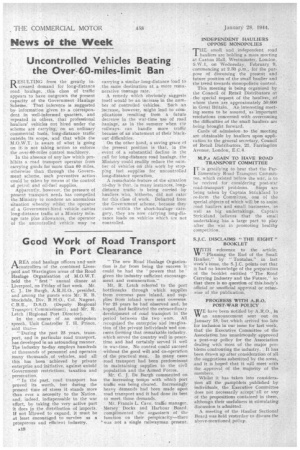Good Work of Road Transport in Port Clearance
Page 20

If you've noticed an error in this article please click here to report it so we can fix it.
AREA road haulage officers hml-unit controllers of the combined Liverpool and Warrington areas of the Road Haulage Organization of M.O.W.T. held the " first " annual dinner at Liverpool, on Friday of last week. Mr.
C. J. De Burgh, presided, and among the guests were Mr, R. B. Stockdale, Div. R.H.O., Col. -Nugent, C.B.E., D.S.O. (Deputy Regional Transport Commissioner), and Mr. R.
Leict (Regional Port Director). "
In the course of an outspoken speech. Unit Controller T. H. Prince, said that
" During -the past 25 years, transport, and in particular road transport, has developed in an astounding manner. The industry to-day employs hundreds of thousands of personnel and operates many thousands , of vehicles, and all this has been achieved by private enterprise and initiative, against untold Government restrictions, taxation and persecution.
. " In the past, road transport has proved its worth, but during the • present time of stress it stands More than ever a necessity to the Nation. arid, indeed, indispensable to the war effort, by taking the very active part it does in the distribution of imports. If not llosied to expand, it must he at least encouraged to survive as a prosperous and efficient industry_ " The new Road Haulage Organization is .far from being the success it • could he had the ' powers that be ' given the industry sufficientencouragement and remuneration."
Mr. R. Letch referred to the port bottlenecks through which supplies from overseas pass inland, and supplies from inland were sent overseas. For 25 years he had observed and, he hoped, had facilitated the extraordinary development of road transport in the period between the tWo wars. All recognized the enterpriseand imagination of the private individuals and conterns forming that remarkable industry. which served the country well in peacetime and had certainly served 'it well in war-time. No control could succeed without the good will and to-operation of the practical men. In many cases road transport had been predominant in maintaining supplies to the civil population and the Armed Forces.
Mr. C. J. De Burgh commented on the increasing tempo with which port traffic was being cleared. Increasingly heavy demands had been made upon road transport and it had done its best to meet those demands.
Mr. Francis L; Cave, traffic manager, Mersey Docks and Harbour Board, complimented the Organizers of the function on their perspicacity—there
• was not a single railwayman present.




















































